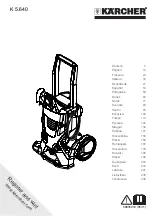
17 - ENG
NOTICE:
Use of fuels with greater than 10% ethanol are
not approved for use in this product per EPA regulations
and will damage the unit and void the warranty.
2. Check engine oil level. See
Engine Owner’s Manual
for correct procedure.
3. Connect the water hose to the water source. Turn the water source on to remove
all air from the hose. When a steady stream of water is present, turn the water
source off.
4. Verify the filter screen (M) is in water inlet of pump.
NOTE:
Convex side faces out.
5. Connect water source (N) to pump inlet (J).
NOTE:
Water source must provide a
minimum of 5 gallons per minute at 20 psi.
6. Connect high pressure hose (C) to pump outlet (I).
I
12
C
11
N
J
M
10
WARNING: To reduce the possibility of contamination always
protect against backflow when connected to a potable water system.
7. Choose the correct nozzle for the job to be performed. See
How To Use spray
Wand
instructions in this section.
NOTE:
If applying a chemical or cleaning
solution, see
How To Apply Chemicals/Cleaning Solvents
instructions in
this section.
8. Turn water source on.
NOTICE:
Risk of property damage. Failure to do so could cause damage to the pump.
9. Remove all air from the pump and high pressure hose by depressing trigger until a
steady stream of water is present.
10. Start engine. See
Engine Owner’s Manual
for correct procedure.
WARNING: Risk of unsafe operation. If engine does not start after
two pulls, squeeze trigger of gun to relieve pump pressure. Pull starter
cord slowly until resistance is felt. Then pull cord rapidly to avoid
kickback and prevent hand or arm injury.
11. Depress trigger on gun to start water flow.
WARNING: Risk of unsafe operation. Stand on a stable surface and
grip gun/spray wand firmly with both hands. Expect the gun to kick
when triggered.
12. Release trigger to stop water flow.
WARNING:
Do not allow the unit to run for more than two minutes
without the gun trigger being pulled. This could cause overheating
and damage to the pump. When the temperature inside the pump
rises too high, the thermal relief valve will open and release a spray
of water from the pump to lower the internal temperature. The valve
will then close.








































